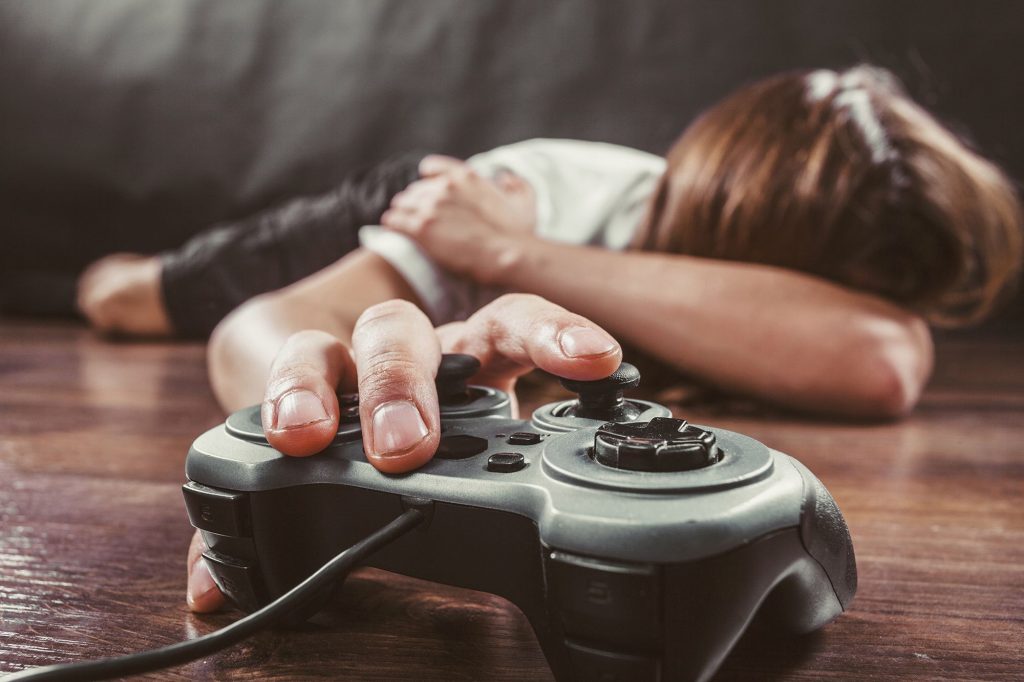For many individuals, video games are an enjoyable hobby that helps to relieve stress and facilitate new social connections. Most people who play video games regularly are able to do so without developing an addiction. However, it is thought that between 1-10% of gamers experience a compulsion to game that is interfering with their daily functioning.
Internet gaming disorder was listed in the DSM-5 as a condition requiring further study. However, in 2018, The World Health Organization included gaming disorder in their International Classification of Diseases as a unique mental health condition. This diagnosis is defined by patterns of gaming marked by loss of control, gaming that starts to take precedence over all other aspects of life and the inability to stop gaming despite negative consequences.
Researchers are continuing to develop new insights into video game addiction, as compared to other behavioral addictions such as gambling. There has also been proven to be similarities between video game addiction and substance addiction. As both video games and addictive substances trigger the release of the chemical dopamine, they ignite similar changes in the brain that re-enforces continued behavior.
There has been shown to be a significant correlation between video game addiction and other mental health conditions such as depression, anxiety and ADHD. For more information about these conditions and to take a screening test to determine if you may have depression, anxiety or ADHD, click here.
Signs of Video Game Addiction
Warning signs that may indicate the presence of gaming disorder include:
- Preoccupation with gaming
- Inability to control amount of time spent gaming
- Prioritizing gaming over everything else (while neglecting school/work, relationships, etc.)
- Withdrawal symptoms when unable to game (such as irritability or anxiety)
- Lying about time spent gaming or playing in secret
- Isolation from others
- Loss of interest in other previously enjoyed activities
A key indication of gaming disorder is whether an individual feels powerless over stopping gaming, despite its negative consequences on various areas of their life.

Effects of Video Game Addiction
Video game addiction has the potential to impact all areas of life including work/school, relationships and health. It is common for an individual with a gaming addiction to experience a decline in their work or academic performance, as they spend their days gaming instead of studying or meeting deadlines. It is also likely that an individual’s relationships will become strained due to preoccupation with gaming as well as distress when they have to step away from gaming.
It is also possible for gaming addiction to take a toll on one’s physical health. An individual may sacrifice sleep, skip meals or forego exercise in order to continue gaming. There is also the potential to develop physical problems such as eye strain, migraines or carpal tunnel syndrome due to excessive gaming.
Seeking Support for Video Game Addiction
If you believe you may be experiencing signs of video game addiction, it is important to reach out for support from a mental health professional. It is very difficult to try to address addiction on your own, as it requires more than will-power to stop the behavior. Professional treatment is needed in order to address the underlying issues contributing to the addictive behavior.
While treatment specifically for gaming disorder is still in the works, cognitive behavioural therapy has been shown to be beneficial in reframing unhelpful thoughts. A therapist can help you to identify the presence of depression or anxiety that may be triggering the need to escape reality through video games. Recovery is possible for individuals experiencing video game addiction, and there is hope to regain control of your life again through proper treatment.

Marie Miguel has been a writing and research expert for nearly a decade, covering a variety of health-related topics. Currently, she is contributing to the expansion and growth of a free online mental health resource with Mind-Diagnostics.org. With an interest and dedication to addressing stigmas associated with mental health, she continues to specifically target subjects related to anxiety and depression.
Check out more of our guest posts HERE.